| Hupodonta | |
|---|---|
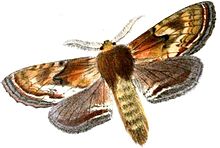 | |
| Hupodonta pulcherrima | |
| Scientific classification | |
| Kingdom: | |
| Phylum: | |
| Class: | |
| Order: | |
| Family: | |
| Subfamily: | |
| Genus: | Hupodonta Butler, 1877 |
Hupodonta is a genus of moths of the family Notodontidae erected by Arthur Gardiner Butler in 1877. [1]
| Hupodonta | |
|---|---|
 | |
| Hupodonta pulcherrima | |
| Scientific classification | |
| Kingdom: | |
| Phylum: | |
| Class: | |
| Order: | |
| Family: | |
| Subfamily: | |
| Genus: | Hupodonta Butler, 1877 |
Hupodonta is a genus of moths of the family Notodontidae erected by Arthur Gardiner Butler in 1877. [1]

Attevidae is a family of moths of the Yponomeutoidea superfamily, containing only one genus, Atteva. The group has a pantropical distribution, but at least one species has a range that extends into the temperate zone. No consistent hypotheses regarding the relationships, placement, and ranking of Attevidae have been published, but the prevalent view is that they likely form a monophyletic group within the Yponomeutoidea.

Orgyia is a genus of tussock moths of the family Erebidae. The genus was described by Ochsenheimer in 1810. The species are cosmopolitan, except for the Neotropical realm.
Josef Schintlmeister was an Austrian-German nuclear physicist and alpinist from Radstadt. During World War II, he worked on the German nuclear energy project, also known as the Uranium Club. After World War II, he was sent Russia to work on the Soviet atomic bomb project. After he returned to Vienna, he took positions in East Germany. He was a professor of physics at the Technische Hochschule Dresden as well holding a leading scientific position at the Rossendorf Central Institute for Nuclear Research.
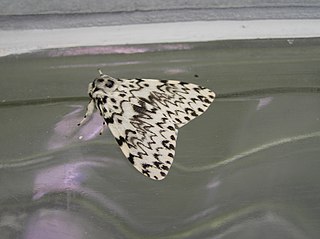
Lymantria is a genus of tussock moths in the family Erebidae. They are widely distributed throughout Europe, Japan, India, Sri Lanka, Myanmar, Java, and Celebes. The genus was described by Jacob Hübner in 1819.
The Obtectomera is a clade of macro-moths and butterflies, comprising over 100,000 species in at least 12 superfamilies.
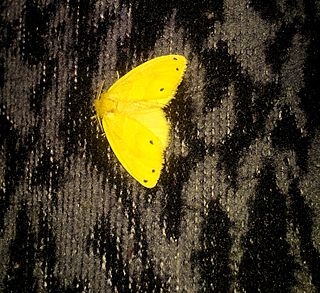
Artaxa is a genus of tussock moths in the family Erebidae erected by Francis Walker in 1855. Some of the species have urticating hairs.
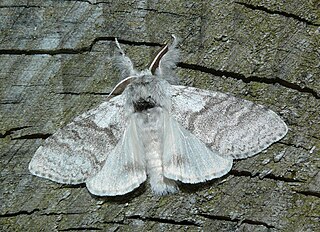
Calliteara is a genus of tussock moths in the family Erebidae. The genus was erected by Arthur Gardiner Butler in 1881.
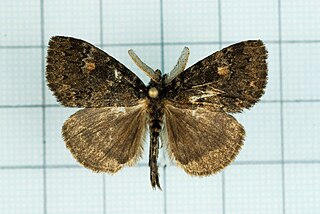
Ilema is a genus of tussock moths in the family Erebidae. The genus was described by Moore in 1860.
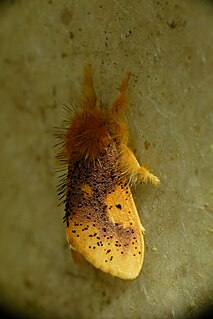
Nygmia is a genus of tussock moths in the family Erebidae. The genus was erected by Jacob Hübner in 1820.
Orvasca is a genus of tussock moths in the family Erebidae. The genus was erected by Francis Walker in 1865.

Phalera is a genus of moths of the family Notodontidae.

Cerura is a genus of moths of the family Notodontidae described by Schrank in 1802.

Fentonia is a genus of moths of the family Notodontidae erected by Arthur Gardiner Butler in 1881.

Netria is a genus of moths of the family Notodontidae erected by Francis Walker in 1855.
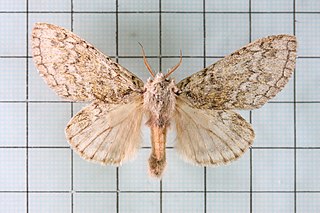
Syntypistis is a genus of moths of the family Notodontidae first described by Turner in 1907.

Stauropus is a genus of moths of the family Notodontidae first described by Ernst Friedrich Germar in 1812.
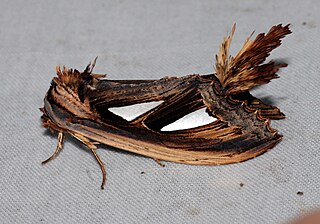
Tarsolepis is a genus of moths in the family Notodontidae erected by Arthur Gardiner Butler in 1872.
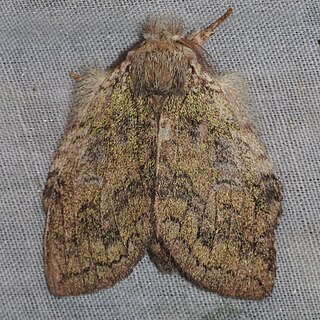
Parasinga is a genus of moths in the family Notodontidae described by Sergius G. Kiriakoff in 1967.

Stenoma is a genus of moths. The type species is Stenoma litura, which was described by Philipp Christoph Zeller in 1839.
| This article on a moth of the family Notodontidae is a stub. You can help Wikipedia by expanding it. |